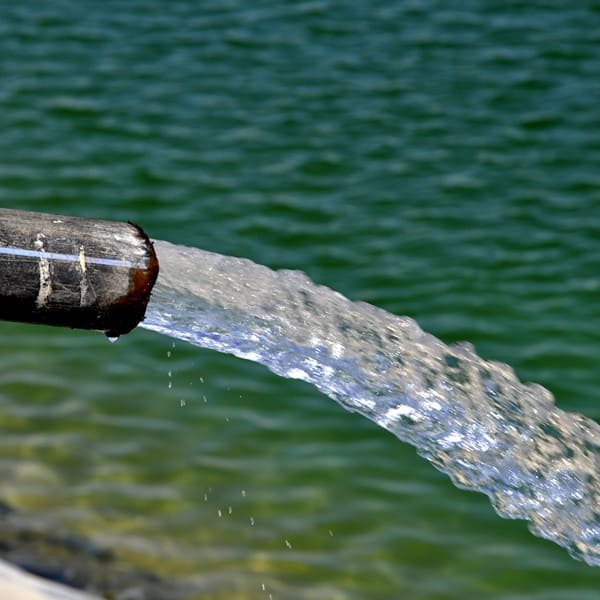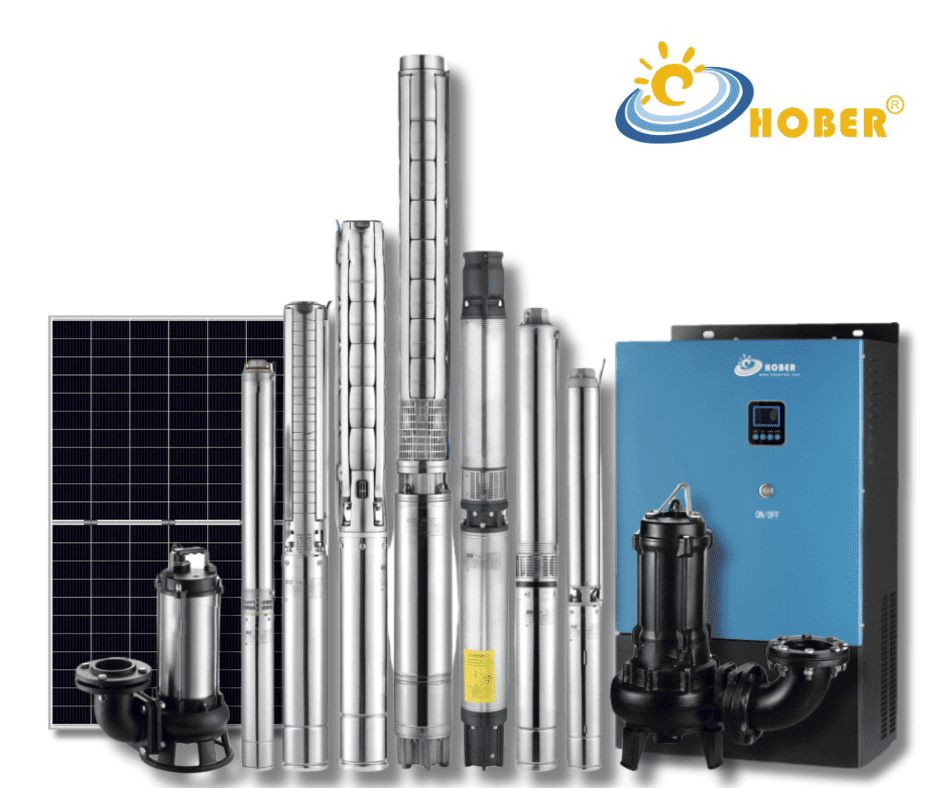Introduction
In agricultural irrigation, particularly in river water irrigation, solar sewage pumps have become a highly efficient, eco-friendly, and adaptable tool for extracting water. These pumps deliver significant operational benefits and provide a sustainable solution for farmers and agricultural operators.

The Advantages of Solar Sewage Pumps
Solar sewage pumps are ideal for river water irrigation due to their energy efficiency, durability, and strong self-priming capabilities. Specifically designed to handle water with suspended solids, these pumps perform well in remote areas or regions with limited access to electricity, offering a cost-effective and environmentally friendly irrigation method.
1. Efficient Water Extraction
Solar sewage pumps are particularly suited to extracting water from rivers and other surface sources. Designed to handle liquids with solid particles, they maintain reliable performance even when water levels are low or flow is slow. With superior self-priming and anti-clogging capabilities, solar sewage pumps ensure high efficiency in diverse and challenging environments.
2. Adaptable and Versatile
Another key advantage of solar sewage pumps is their adaptability. These pumps effectively handle water mixed with silt, sediment, and other solids, which is crucial for effective river water irrigation. This versatility broadens the range of usable water sources, making irrigation systems more resilient and flexible.
3. Cost Savings
Solar sewage pumps offer significant cost savings by reducing reliance on groundwater sources. Drawing directly from rivers and other surface sources, farmers can minimize their irrigation expenses, particularly in areas where reliable water sources are scarce. Solar power further reduces costs by eliminating the need for electricity or fuel.
4. Environmentally Friendly
Solar sewage pumps help to conserve groundwater resources by reducing over-extraction, a common contributor to local ecological imbalance. By utilizing solar energy, these pumps provide a “green” irrigation solution that decreases dependency on conventional power sources while helping to preserve local ecosystems and water cycles.
5. Operational Flexibility
Solar sewage pumps are known for their mobility and flexibility. With relatively lightweight designs, they can be easily moved and set up across different locations as required. Farmers can adjust irrigation setups based on crop needs, weather changes, and other factors, enabling efficient and adaptable water management.
Key Considerations for Using Solar Sewage Pumps

Selecting the Right Head and Flow Rate
When selecting a solar sewage pump, it is essential to consider the appropriate head and flow rate. The total head should include both vertical height and horizontal distance. For installations on slopes, trigonometric calculations can help estimate the effective vertical height. This ensures optimal pump performance and water extraction efficiency.
Choosing an Optimal Installation Location
Choosing a stable and level location near the riverbank is critical for effective installation. Installing a filter screen at the intake prevents larger debris from entering and damaging the pump. It’s also recommended to use check and gate valves on discharge lines to prevent backflow and clogging, enhancing efficiency and longevity.
Handling Weight and Lift Requirements
For heavier sewage pumps (typically over 80 kilograms), professional lifting equipment and couplings are necessary for safe handling. Proper installation not only simplifies maintenance but also enhances the pump’s longevity by minimizing physical strain on components.
Regular Maintenance
While solar sewage pumps are durable, routine maintenance is necessary for optimal performance. Regularly inspect components like impellers and bearings, and clear away debris buildup to prevent clogs. After each use, drain the pump of any remaining water and clean it thoroughly to avoid corrosion and blockages, ensuring the system is ready for the next operation.
The Key Components of a Solar Sewage Pump System

A solar sewage pump system integrates several crucial components to maximize efficiency and functionality. Understanding these elements helps users set up and maintain an effective system tailored to their irrigation needs.
- Solar Panels
Solar panels are the primary energy source, converting sunlight into the electricity required to power the pump. Panel size and efficiency directly impact the system’s performance, with larger or more efficient panels generating more power, which is especially helpful on cloudy days or during peak usage periods. - Solar Pump Inverter
The solar pump inverter regulates power from the solar panels, ensuring a consistent and safe energy supply to the pump. Many inverters feature Maximum Power Point Tracking (MPPT) technology, which optimizes power output as sunlight intensity changes throughout the day, maximizing efficiency. - Sewage Pump
As the system’s core, the sewage pump is specifically designed to handle water with impurities, including silt, sediment, and larger particles. These pumps are generally durable and equipped with self-priming and anti-clogging features to ensure consistent, reliable performance even in challenging water conditions. - Solar Panel Mounting Structure
Solar panels require a secure mounting structure that allows for optimal angling to capture sunlight effectively. Properly mounted panels increase energy conversion efficiency, while support structures for the pump ensure stability, particularly when installed along riverbanks. - Combiner Box
The combiner box consolidates power from multiple solar panels, providing a streamlined power source for the pump. It also contains necessary circuit breakers and surge protection to safeguard the system, ensuring stable and safe operation. - Filter Screen
A filter screen at the pump intake prevents large debris from entering the pump, minimizing wear and reducing the risk of clogging. This component is essential for maintaining pump efficiency and extending the system’s operational life. - Check Valve and Gate Valve
These valves prevent water backflow and help control water flow within the discharge pipeline, reducing the chance of clogging and enhancing system reliability. They are particularly useful when the pump intake is near the water surface.
Conclusion
The efficiency, flexibility, and environmental benefits of solar sewage pumps make them an excellent choice for river water irrigation. They provide cost savings and help protect local water resources, offering a practical, sustainable irrigation solution. Farmers, dealers, and installers are encouraged to explore the advantages of solar sewage pumps to improve productivity and promote environmentally friendly agricultural practices.
Additional Pump Options for River Water Irrigation

When it comes to river water irrigation, choosing the right type of pump is essential. While solar sewage pumps are highly effective for handling water sources with sediment, silt, or larger particles, another option to consider is the solar surface pump.
A solar surface pump is suitable for cleaner water sources where there are fewer suspended particles or impurities. These pumps are typically positioned above the water’s surface, making them easier to install and maintain in situations where water quality is not a concern. Solar surface pumps are often preferred for irrigation applications with clear water sources, as they can deliver a high flow rate with energy efficiency.
Choosing between a solar sewage pump and a solar surface pump depends on:
- Water Quality: Use a sewage pump for sediment-laden water and a surface pump for clearer sources.
- Installation Preferences: Surface pumps are easier to access and maintain since they operate from above the water source.
- Flow Requirements: Both options are solar-powered, but specific flow rates and energy requirements may differ based on irrigation needs.
Each pump type provides efficient, eco-friendly irrigation solutions powered by solar energy, enabling farmers and agricultural operators to select the best system based on local water conditions and irrigation demands.
FAQ
What are the main advantages of using solar sewage pumps for river water irrigation?
Solar sewage pumps offer high efficiency, adaptability, cost savings, environmental benefits, and operational flexibility. They are designed to handle water with impurities, making them ideal for river irrigation and areas with limited access to electricity.
How do I determine the right head and flow rate for my solar sewage pump?
Consider both the vertical height and horizontal distance required. If there is an incline in the horizontal section, use trigonometric calculations to estimate the effective vertical head. This calculation will help ensure your pump’s efficiency and water extraction rate are optimized.
What maintenance is required for solar sewage pumps?
Routine checks of key components, including the impeller and bearings, are recommended. Regularly clear debris to prevent clogs, and after each use, drain and clean the pump to avoid corrosion and blockages.
Is a solar sewage pump suitable for different types of water sources?
Yes, solar sewage pumps are highly adaptable and can handle water containing silt, sediment, and other impurities, making them well-suited for diverse water sources, especially river water.

